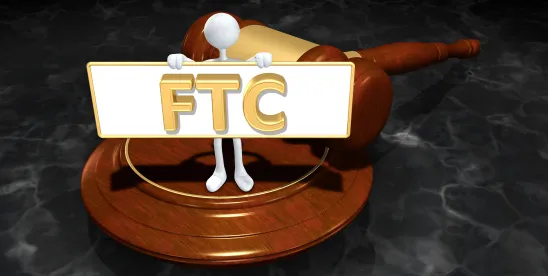On May 21, 2025, the Federal Trade Commission (FTC) issued its third round of warning letters – and its first under the Trump administration – against pharmaceutical manufacturers for allegedly improper listing of patents in the Food and Drug Administration’s (FDA) Orange Book. The FTC made clear that its prerogative under President Trump’s leadership is to seek “transparent, competitive, and fair healthcare markets.”
The FTC issued renewed warning letters to drugmakers that did not delist previously challenged Orange Book listings, disputing more than 200 patents across 17 brand-name pharmaceuticals. The patents relate to device components of combination drug-device products treating asthma, diabetes, and chronic obstructive pulmonary disease (COPD). The FTC alleges the device patents constitute improper listings that allow brand-name manufacturers to delay – or even prohibit – generic competition. These patents were previously the subject of warning letters the FTC issued in November 2023 and April 2024 to more than a dozen pharmaceutical manufacturers. Although some manufacturers delisted patents in response to the initial warning letters, others chose to continue listing the targeted patents in the Orange Book.
In Depth
BACKGROUND
The FTC issued a policy statement in 2023 under Chair Lina Khan declaring that “improper” pharmaceutical patent listings in the Orange Book may constitute an unfair method of competition in violation of Section 5 of the FTC Act. The patents are listed for the purpose of putting generic rivals on notice to deter patent infringement. The FDA, however, takes only a ministerial role as to listing patents and does not assess whether patents are properly listed in the Orange Book. Following the 2023 policy statement, the FTC issued a series of warning letters to manufacturers.
In the FTC’s recent warning letters, the agency cites the December 2024 US Court of Appeals for the Federal Circuit decision in Teva Branded Pharm. Prods. R&D, Inc. v. Amneal Pharms. of N.Y., LLC as support for their assertion that the previously identified patents are improperly listed. The Federal Circuit affirmed a lower court’s order requiring Teva to delist five patents associated with its ProAir® HFA inhaler, a drug-device combination product, from the Orange Book. The court found Teva had improperly listed its ProAir HFA inhaler patents in the Orange Book for primarily two reasons:
- First, Teva had misinterpreted the requirements set forth in the listing statute by arguing that the term “drug” encompasses any component of an article that treats a disease, and therefore its patents claiming the device components would also “claim the drug.” The Federal Circuit rejected this argument, holding that determining whether a patent is properly listed “requires what amounts to a finding of patent infringement,” and the mere fact that a product could infringe a patent does not mean the patent “claims” the underlying drug.
- Second, Teva argued that a patent can be listed when it claims any part of the product other than the active ingredient, and therefore its patents that claim the device component are valid. The Federal Circuit rejected this argument, holding that in order for a patent to claim the “drug” and be listed in the Orange Book, the patent must claim at least the active ingredient of the approved product, as the active ingredient provides the primary mode of action of the drug.
The Federal Circuit subsequently denied Teva’s request for an en banc rehearing in March 2025. Notwithstanding Teva’s petition seeking Supreme Court review, Teva must now delist the five patents.
WHAT’S NEXT
On the day following the Federal Circuit’s opinion, the FTC issued a press release applauding the Federal Circuit’s holding and reiterating its position that, due to the 30-month statutory stay triggered by listing patents in the Orange Book, improper listings can negatively affect competitive conditions permitting generic entry of competing drug products. The press release, however, was issued in the waning days of Chair Khan’s tenure with a Democratic majority at the FTC, and practitioners and industry stakeholders alike questioned whether the FTC’s policy on Orange Book listings would continue under a Republican-led FTC. The recent warning letters suggest that, under current Chair Andrew Ferguson, the FTC appears to be sticking to the prior administration’s policy and remains focused on enhancing competition between brand-name and generic pharmaceuticals to lower healthcare costs.
The Federal Circuit’s decision vindicated the FTC’s position against improper listings in the Orange Book and likely empowered the agency to undertake the most recent enforcement efforts despite the change in administration. The agency’s continued scrutiny of patent listings in the Orange Book indicates it is possible the FTC may pursue enforcement actions concerning its Orange Book challenges in the future. Therefore, brand-name manufacturers are advised to carefully review their current listings, paying particular attention to the underlying claim of the patent, as patents that do not claim the active ingredient in the drug may be considered improperly listed. Brand-name manufacturers are encouraged to proactively seek counsel when conducting such reviews to ensure compliance.





 />i
/>i
